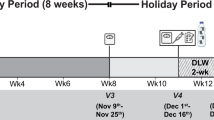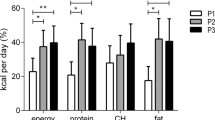Abstract
Diets for the prevention and treatment of obesity are often informed by theories about food characteristics believed to support spontaneous reductions in ad libitum energy intake without inducing hunger. Here we estimated how energy density, hyper-palatability, protein content and eating rate affected ad libitum energy intake of 2,733 meals from four dietary patterns. Energy density, eating rate and hyper-palatable foods were consistently positively related to meal energy intake across all diets. Protein content was positively related to meal energy intake during ultraprocessed and unprocessed diets but was not significantly related to energy intake of minimally processed low-fat or low-carbohydrate meals.
This is a preview of subscription content, access via your institution
Access options
Access Nature and 54 other Nature Portfolio journals
Get Nature+, our best-value online-access subscription
$29.99 / 30 days
cancel any time
Subscribe to this journal
Receive 12 digital issues and online access to articles
$119.00 per year
only $9.92 per issue
Buy this article
- Purchase on Springer Link
- Instant access to full article PDF
Prices may be subject to local taxes which are calculated during checkout
Similar content being viewed by others
Data availability
The de-identified individual data from consenting participants and statistical analysis code are posted on the Open Science Framework website at https://osf.io/y3n9a/.
References
Appleton, K. M. et al. Sensory and physical characteristics of foods that impact food intake without affecting acceptability: systematic review and meta-analyses. Obesity Rev. 22, e13234 (2021).
Forde, C. G. & de Graaf, K. Influence of sensory properties in moderating eating behaviors and food intake. Front. Nutr. 9, 841444 (2022).
Halton, T. L. & Hu, F. B. The effects of high protein diets on thermogenesis, satiety and weight loss: a critical review. J. Am. Coll. Nutr. 23, 373–385 (2004).
Rolls, B. J. The relationship between dietary energy density and energy intake. Physiol. Behav. 97, 609–615 (2009).
Robinson, E., Khuttan, M., McFarland-Lesser, I., Patel, Z. & Jones, A. Calorie reformulation: a systematic review and meta-analysis examining the effect of manipulating food energy density on daily energy intake. Int. J. Behav. Nutr. Phys. Act. 19, 48 (2022).
Robinson, E. et al. A systematic review and meta-analysis examining the effect of eating rate on energy intake and hunger. Am. J. Clin. Nutr. 100, 123–151 (2014).
Fazzino, T. L. The reinforcing natures of hyper-palatable foods: behavioral evidence for their reinforcing properties and the role of the US food industry in promoting their availability. Curr. Addict. Rep. 9, 298–306 (2022).
Fazzino, T. L., Rohde, K. & Sullivan, D. K. Hyper-palatable foods: development of a quantitative definition and application to the US Food System Database. Obesity 27, 1761–1768 (2019).
Fazzino, T. L., Bjorlie, K., Rohde, K., Smith, A. & Yi, R. Choices between money and hyper-palatable food: choice impulsivity and eating behavior. Health Psychol. 41, 538–548 (2022).
Fazzino, T. L., Dorling, J. L., Apolzan, J. W. & Martin, C. K. Meal composition during an ad libitum buffet meal and longitudinal predictions of weight and percent body fat change: the role of hyper-palatable, energy dense, and ultra-processed foods. Appetite 167, 105592 (2021).
Hall, K. D. et al. Effect of a plant-based, low-fat diet versus an animal-based, ketogenic diet on ad libitum energy intake. Nat. Med. 27, 344–353 (2021).
Hall, K. D. et al. Ultra-processed diets cause excess calorie intake and weight gain: an inpatient randomized controlled trial of ad libitum food intake. Cell Metab. 30, 67–77.e3 (2019).
Bjorlie, K. et al. Hyper-palatable food consumption during binge-eating episodes: a comparison of intake during binge eating and restricting. Int. J. Eat. Disord. https://doi.org/10.1002/eat.23692 (2022).
Bertenshaw, E. J., Lluch, A. & Yeomans, M. R. Dose-dependent effects of beverage protein content upon short-term intake. Appetite 52, 580–587 (2009).
Barkeling, B., Rössner, S. & Björvell, H. Effects of a high-protein meal (meat) and a high-carbohydrate meal (vegetarian) on satiety measured by automated computerized monitoring of subsequent food intake, motivation to eat and food preferences. Int. J. Obes. 14, 743–751 (1990).
Johnson, J. & Vickers, Z. Effects of flavor and macronutrient composition of food servings on liking, hunger and subsequent intake. Appetite 21, 25–39 (1993).
Akhavan, T., Luhovyy, B. L. & Anderson, G. H. Effect of drinking compared with eating sugars or whey protein on short-term appetite and food intake. Int. J. Obes. 35, 562–569 (2011).
Astbury, N. M., Stevenson, E. J., Morris, P., Taylor, M. A. & Macdonald, I. A. Dose–response effect of a whey protein preload on within-day energy intake in lean subjects. Br. J. Nutr. 104, 1858–1867 (2010).
Porrini, M. et al. Weight, protein, fat, and timing of preloads affect food intake. Physiol. Behav. 62, 563–570 (1997).
Stubbs, R. J., van Wyk, M. C., Johnstone, A. M. & Harbron, C. G. Breakfasts high in protein, fat or carbohydrate: effect on within-day appetite and energy balance. Eur. J. Clin. Nutr. 50, 409–417 (1996).
Weigle, D. S. et al. A high-protein diet induces sustained reductions in appetite, ad libitum caloric intake, and body weight despite compensatory changes in diurnal plasma leptin and ghrelin concentrations. Am. J. Clin. Nutr. 82, 41–48 (2005).
Lejeune, M. P. G. M., Kovacs, E. M. R. & Westerterp-Plantenga, M. S. Additional protein intake limits weight regain after weight loss in humans. Br. J. Nutr. 93, 281–289 (2005).
Leidy, H. J., Tang, M., Armstrong, C. L. H., Martin, C. B. & Campbell, W. W. The effects of consuming frequent, higher protein meals on appetite and satiety during weight loss in overweight/obese men. Obesity 19, 818–824 (2011).
Westerterp-Plantenga, M. S., Nieuwenhuizen, A., Tomé, D., Soenen, S. & Westerterp, K. R. Dietary protein, weight loss, and weight maintenance. Annu. Rev. Nutr. 29, 21–41 (2009).
Acknowledgements
This work was supported by the Intramural Research Program of the National Institutes of Health, National Institute of Diabetes & Digestive & Kidney Diseases.
Author information
Authors and Affiliations
Contributions
T.L.F. and K.D.H. conceptualized these secondary analyses. Data were assembled by A.B.C., and J.G. analysed the data. All authors contributed to writing the manuscript.
Corresponding author
Ethics declarations
Competing interests
The authors declare no competing interests.
Peer review
Peer review information
Nature Food thanks Kees de Graaf, Lewis James, Faidon Magkos and the other, anonymous, reviewer for their contribution to the peer review of this work.
Additional information
Publisher’s note Springer Nature remains neutral with regard to jurisdictional claims in published maps and institutional affiliations.
Supplementary information
Supplementary Information
Supplementary Fig. 1 and Tables 1–6.
Rights and permissions
About this article
Cite this article
Fazzino, T.L., Courville, A.B., Guo, J. et al. Ad libitum meal energy intake is positively influenced by energy density, eating rate and hyper-palatable food across four dietary patterns. Nat Food 4, 144–147 (2023). https://doi.org/10.1038/s43016-022-00688-4
Received:
Accepted:
Published:
Issue Date:
DOI: https://doi.org/10.1038/s43016-022-00688-4
This article is cited by
-
Ultra-processed Food and Obesity: What Is the Evidence?
Current Nutrition Reports (2024)



